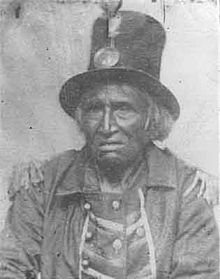- Chief Tamaha
-
Chief Standing Moose or more commonly as Chief Tamaha (c. 1776-1864) was a Mdewakanton Sioux. Born near Winona, Minnesota, he lost an eye in an accident as a child so he was called "Tamaha" ("One eye") in the Dakota language, which the French called him "Le Borgne", or "One Eye." English picked up the name as "the One-eyed Sioux."
In 1806 and 1807, Tamaha became a friend of U.S. Army lieutenant Zebulon M. Pike and was one of the Sioux leaders who supported the United States in the War of 1812. He retained his loyalty even after his capture by the British, during which he refused to divulge information about the Americans on pain of death (a threat which turned out to be a bluff).Because of his loyalty to America, Tamaha was presented a Peace Medal and Loyalty papers by William Clarke. These papers can be seen at the Minnesota History Center.Tamaha carried these papers with him and would charge people to see them. Tamaha was known as a powerful orator and a diplomat of unusual ability. Wearing his trademark stovepipe hat, he managed to maintain amicable relations between whites and Indians. Before the Dakota War of 1862 Chief Tamaha stood before Little Crow and advised him he not go to war against the whites. This speech can be found in Indian Heroes and Great Chieftains by Charles Eastman.Tamaha did not die in 1860, he died in 1864 after the Dakota War. According to Charles Eastman he died at Fort Pierre S.D. ]].[1]
Notes

This article about an Indigenous person of North America is a stub. You can help Wikipedia by expanding it.

